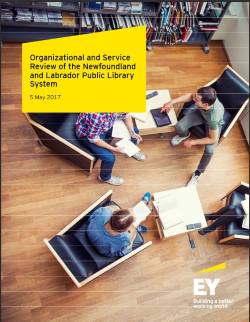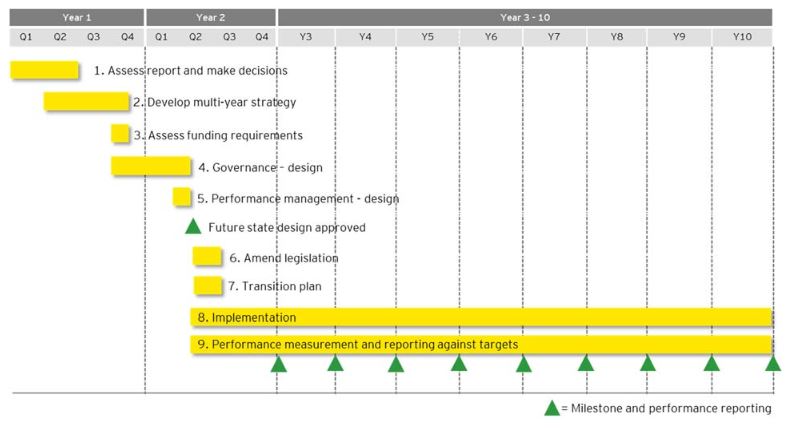
Newfoundland and Labrador Public Libraries releases EY Final Report on Library System Review
May 18, 2017
News Release
The Provincial Information and Library Resources Board today released the Organizational and Service Review of the Newfoundland and Labrador Public Library System.
The report by EY outlines a number of recommendations for improving the public library system in Newfoundland and Labrador. It represents the culmination of a comprehensive series of province-wide public consultations on the public library system and an in-depth independent analysis of the system by EY.
“We are very pleased to release the EY report on our provincial public library system today,” said Calvin Taylor, Chair of the Provincial Information and Library Resources Board. “We look forward to working with all stakeholders and the Provincial Government toward the development of a strategic plan for the continued delivery of public library services for residents throughout the province.”
The Board is currently reviewing the report in depth and will meet with Provincial Government officials to discuss its contents.
Organizational and Service Review of the Newfoundland and Labrador Public Library System
Executive Summary
The Department of Education and Early Childhood Development (EECD) and the Provincial Information and Library Resources Board (Provincial Board) engaged Ernst & Young LLP (EY) in June 2016 to perform an organizational and service review (the Review) of the Newfoundland & Labrador Public Libraries system (NLPL). The aim of the Review is to identify and prioritize opportunities to improve the public library system across the Province of Newfoundland and Labrador (the Province).
An important aspect of the Review was to engage with the public and other stakeholders to obtain perspectives on the current role of the NLPL. It is clear that the NLPL and the services it provides are very important to the citizens of the Province. It performs the vital role of providing access to information while supporting literacy and education. The library is viewed as a gathering place, a social hub and a place to access community and historical information. Many of the views expressed by members of the public and other stakeholders are shared by the Provincial Board. Unfortunately, the Provincial Board and the NLPL face significant challenges in fulfilling that role.
Challenge 1 — Funding
The NLPL has been significantly underfunded for some time despite the fact that the amount of funding provided by the Government of Newfoundland and Labrador (Provincial Government) is, on a per capita basis, much higher than that provided by any other provincial government in the country.
- Total funding (all sources) — Total NLPL funding is at $22.67 per capita. This is 42% below the national average of $39.21 per capita, representing a total difference of $8.83m.
- Provincial Government funding — The Provincial Government provides almost all of the NLPL’s funding through an annual operating grant to the Provincial Board of $21.70 per capita. This is 95.7% of the NLPL’s total funding and is more than twice the national average of $10.80 per capita, representing a total difference of $4.35m.
- Municipal government funding — Municipal governments provide funding to the NLPL at $2.02 per capita consisting of cash and in-kind contributions. This is 92% below the national average of $26.10 per capita, representing a total difference of $12.40m.
Challenge 2 — Location of libraries
The NLPL has evolved over 80 years in a manner that has resulted in a suboptimal number and location of libraries and a resultant suboptimal use of scarce funding. There are a number of libraries located very close to each other and several in very small communities with declining populations.
Impact of these challenges
As a result of these challenges, the NLPL is significantly underperforming in key aspects of service delivery including operating hours, collections, programs, technology and facilities.
Improving the NLPL’s performance to levels seen in other jurisdictions cannot be achieved through piecemeal efforts at existing funding levels. Attempting to do more with less (or the same) will not lead to successful outcomes. Structural changes at the governance, funding and service delivery levels are needed to deliver significant and sustainable change. A major shift is required — one that sees a public library system as a partnership amongst the Provincial Government, municipal governments and other community partners with shared responsibility for funding and other key matters. Without change, the system will continue to underperform and lose its relevance.
Key recommendations summary
The key recommendations arising from the Review are summarized below along with references describing where each key recommendation, and additional information related thereto, can be found in this Report. A complete list of all recommendations is in Section 6.
Recommendation 1: The Provincial Government and the Provincial Board should create a new multi-year strategy that outlines key objectives, initiatives, outcomes and service delivery standards (Governance Recommendation A, page 34).
The multi-year strategy should reflect and incorporate this Report’s recommendations. It will be a tool to engage and align key stakeholders and direct effort and resources.
Recommendation 2: The Provincial Board should optimize the use of its limited funding by reassessing and adjusting the number and locations of public libraries in the Province (Location Recommendation A, page 30).
The Provincial Board must deploy its limited funding in an optimal manner. Using the information, the analyses and the approach suggested in this Report, the Provincial Board should establish library location parameters and explore opportunities to consolidate or close libraries not meeting those parameters. Any savings realized should be reinvested in a manner that best improves access and service across the Province.
Recommendation 3: The Provincial Government should adopt a regional governance and service delivery model in which regional boards have a formal role in governance (Governance Recommendation C, page 34).
The adoption of this model will be a multi-year transitional effort involving the Provincial Board, regional boards and other partners. A regional model would provide increased opportunity and incentive for municipal and community leaders to participate in governance through representation on regional boards where strategies and priorities would recognize and reflect regional and local community needs.
Recommendation 4: The Provincial Government and the Provincial Board should invite Municipalities Newfoundland and Labrador and municipal governments to participate in the co-development of a shared funding model (Funding Recommendation A, page 24).
Under the current funding model, the Provincial Government provides almost all of the NLPL’s funding. In most other Canadian jurisdictions, the provincial and municipal governments have jointly established funding models in which they share the responsibility for funding.
A desired future-state funding model should be determined and a strategy put in place to achieve that model over time. Expectations on achieving increases in municipal funding need to be realistic. The immediate focus should be on larger municipalities. Smaller municipalities should continue to provide, and increase where possible, valuable in-kind contributions.
Recommendation 5: The Provincial Board should continue to explore and implement alternative service delivery methods to improve access to library services (Service Delivery Recommendation I, page 60).
Alternative service delivery (ASD) methods are integral to the delivery of library services, particularly in rural and remote locations. ASD can be used to mitigate the impact of consolidation or closure decisions in affected communities. The NLPL uses fewer alternative service delivery methods than other Canadian jurisdictions.
Recommendation 6: The Provincial Board should explore opportunities to reduce or eliminate lease payments (Funding Recommendation B, page 24).
Significant annual lease costs are incurred for 13 libraries with a significant portion thereof paid to municipal government landlords. The Provincial Board should seek to reduce or eliminate the payments or, where possible, transfer library operations to other provincially or municipally owned properties on a reduced or rent free basis.
Recommendation 7: The Provincial Board should eliminate unnecessary governance processes for local boards (Governance Recommendation B, page 34).
The 91 local library boards have no formal role in the governance of the NLPL yet the Provincial Board spends a considerable amount of administrative time and effort on local board governance processes. The Provincial Board should redirect its time and effort to activities that better enable the NLPL to achieve its objectives. Local boards should continue to support the library system through fundraising efforts, sourcing in-kind contributions and as conduits of relevant local information to formal governing bodies.
Recommendation 8: The Provincial Board should establish a full-time head librarian position (Governance Recommendation D, page 35).
A full-time head librarian position, staffed by a professional librarian, would contribute leadership in the overall development and delivery of the NLPL’s vision and multi-year strategy. The head librarian would be responsible for the regular training and development of library staff and other professional librarians and provide focus and expertise in program development and delivery.
Recommendation 9: The Provincial Board should increase the number of professional librarians in the NLPL and define their role and responsibilities (Service Delivery Recommendation E, page 52).
Professional librarians contribute significantly to the delivery of quality library services and programs and to the provision of proper training and support for library staff and patrons. Currently, the number of professional librarians in the NLPL is low relative to other Canadian jurisdictions. The multi-year strategy should identify the appropriate number, location and role and responsibilities of professional librarians in the NLPL.
Recommendation 10: The Provincial Board should establish service delivery standards (Service Delivery Recommendations A – page 40, B – page 45, C – page 47, D – page 51 and F – page 54).
The Provincial Board’s multi-year strategy should include service delivery standards developed in consultation with the regional boards. Standards should be established for operating hours, collections, technology, facilities, and other key areas. Standards will serve as targets against which to measure ongoing progress and performance.
Recommendation 11: The Provincial Government should amend the Public Libraries Act (Governance Recommendation E, page 35).
The Act should be amended to reflect any changes that might be necessary as a result of this Report or otherwise.
Roadmap
Many of this Report’s recommendations will require transformational change, spanning governance, funding and service delivery. An illustrative multi-year roadmap is presented below.
Figure 1.1: Transformation roadmap

Add a new comment